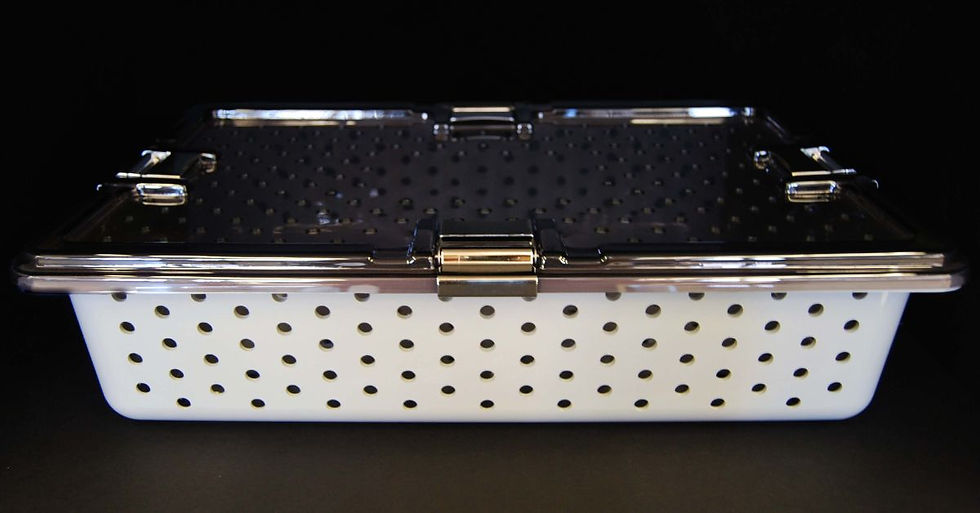
The use of medical-grade plastic in manufacturing has revolutionized the healthcare industry by providing a versatile, reliable, and cost-effective material for various applications. From surgical instruments to medical devices and implants, medical-grade plastic offers numerous advantages over traditional materials like titanium, aluminum and steel. Its lightweight nature, biocompatibility, and ability to be machined or molded into intricate designs make it an ideal choice for creating safe and efficient medical products.
Let's look at the advantages of manufacturing with medical-grade plastic and how it has transformed the medical landscape.
Biocompatibility and Safety
Medical-grade plastics are specifically designed to be biocompatible, meaning they can coexist with human tissues without causing adverse reactions. This characteristic is crucial for products like implants and surgical instruments that come into direct contact with the body. Medical-grade plastics are softer and do not cause abrasion wear over time as metals do. Furthermore, medical-grade plastics are nonporous and resistant to microbial growth, significantly reducing the risk of infection.
These materials can also withstand sterilization processes such as autoclaving and gamma radiation, ensuring that medical devices remain as hygienic as possible. Additionally, the safety of medical-grade plastics is rigorously tested through stringent regulatory standards, providing confidence in their performance and reliability. This exceptional combination of biocompatibility and safety attributes makes medical-grade plastics indispensable in modern healthcare applications.
Lightweight and Durable
Medical-grade plastics are renowned for their lightweight yet durable properties, which facilitate the creation of more ergonomic and user-friendly medical devices. This weight reduction can significantly enhance the comfort and mobility of patients using prosthetics or orthopedic supports. Additionally, the material's inherent durability ensures that devices can withstand the rigors of repeated use and harsh sterilization processes without degrading.
Unlike metal, plastic does not corrode, which prolongs the life span of medical equipment. This durability also extends to packaging, where the strength and resilience of medical-grade plastics offer unmatched protection. These attributes minimize the frequency of replacements, resulting in lower long-term costs and increased reliability for healthcare providers and patients alike.

Versatility in Design
Medical-grade plastics offer unparalleled versatility in design, enabling manufacturers to create complex shapes and intricate details that would be challenging or impossible with traditional materials. Advanced machining and molding techniques allow for the production of custom components tailored to specific medical applications, whether it be intricate surgical instruments or precision-fit implants. This adaptability supports innovation in medical device design, promoting the development of cutting-edge technologies that enhance patient care.
Furthermore, medical-grade plastics can be engineered to meet specific requirements such as flexibility, transparency, or rigidity, depending on the application. This level of customization ensures that each medical device or component performs optimally, contributing to better patient outcomes and increased practitioner confidence in the tools at their disposal.
Resistance to Corrosion and Chemicals
Medical-grade plastics exhibit exceptional resistance to corrosion and harsh chemicals, making them ideal for various medical applications. Unlike metals, which can oxidize and degrade over time, medical-grade plastics maintain their integrity even when exposed to bodily fluids, disinfectants, and other harsh substances. This resistance ensures the longevity and safety of medical devices, as they remain functionally reliable throughout their use.
Additionally, their chemical stability allows for the development of advanced medical solutions, such as drug-delivery systems and diagnostic tools that can withstand aggressive therapeutic substances. This chemical and corrosion resistance not only enhances the longevity and efficacy of medical products but also contributes to improved patient safety and care standards.

Sterilization Capability
The ability of medical-grade plastics to withstand rigorous sterilization processes is a critical advantage. These materials can endure a variety of sterilization methods, including autoclaving, ethylene oxide (EtO) gas, gamma radiation, and chemical disinfectants, without compromising their structural integrity or performance. This high resistance to heat, radiation, and chemicals ensures that medical devices remain hygienic and safe for repeated use.
Maintaining sterility is essential for preventing infections and ensuring patient safety. As such, the robust sterilization capabilities of medical-grade plastics make them indispensable in environments where stringent hygiene standards are paramount, such as hospitals, clinics, and laboratories. This feature significantly contributes to the reliability and effectiveness of medical products.
The integration of medical-grade plastic into the manufacturing of medical devices and products has markedly elevated the standards of healthcare. Its array of benefits makes it an indispensable material in modern medicine. These plastics not only enhance patient comfort and safety but also foster innovation, allowing for the development of advanced medical technologies. Their resistance to corrosion, chemicals, and ability to endure stringent sterilization processes ensures that medical devices remain reliable and hygienic, directly contributing to better patient outcomes.
If you're looking for medical tray manufacturers, Legacy Medical Solutions can provide custom medical trays made from high-quality medical-grade plastics. Our experience and expertise in the field make us an industry leader in manufacturing safe, durable, and reliable medical products. Trust Legacy Medical Solutions to deliver innovative solutions that cater to your specific healthcare needs.




Comments